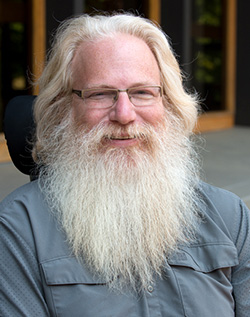News & Notices
Member Spotlight: Michael Maag
 Q&A with Michael Maag: Resident Lighting Designer at Oregon Shakespeare Festival
Q&A with Michael Maag: Resident Lighting Designer at Oregon Shakespeare Festival
How did you begin your career in lighting design?
In high school theatre I was not cast my sophomore year in the production of Dracula, so someone said “Why don’t you do some special effects?” and that was the moment where I had an epiphany. I was running an old auto transformer board and pulling bi-levers around and I realized at that moment that when I was moving levers, I really wasn’t controlling the light as much as I was controlling the emotion of the audience. I decided at that moment that was what I wanted to do for the rest of my life.
What led you to Oregon Shakespeare Festival?
Its reputation as a place that was producing excellent theatre. A place that had artistic integrity about the work that it was doing and just the quality of the work. Before I came, I was having a discussion with someone about the possibility of someday being good enough to spend maybe the last 10 years of my career at the Oregon Shakespeare Festival and hopefully I would be good enough to do that someday. Sure enough, six weeks later the person I was talking to got an offer to come down and a few months later I got an offer to come down so it worked out really well.
How do you take directors ideas and turn them into a reality?
That is the job really. You’re an interpreter of artistic desire and our job is to find a way to manifest those dreams and ideas on stage. You have to be good at understanding the actual artistic intent and you have to understand where the artists are going with the piece and how you can best support it with your technology. When I started doing theatrical lighting you could pretty much get by with just having a crescent wrench and a screw driver. Now you need to be a computer network expert, understand embedded electronics, and have a solid basis in other kinds of electronics. You just can’t get by with the simple stuff to be good at it. I continue learning and growing and riffing off of the ideas of people around me and trying to manifest the best possible work by exploring what’s new and what’s available.
So would you say you draw inspiration by networking with your peers?
Absolutely. We’re constantly trying to find a way to bring to fruition these ideas so we’re constantly learning and growing together. We’re inspiring each other.
Who are some positive influences that you draw from?
Some of the best lighting designers come through the Oregon Shakespeare Festival and I have the extreme pleasure to be able to work with them. A lot of them are a really positive influence on me. I’ve had the pleasure to work with so many really talented people and feel blessed to be in the same room with those folks.
Tell me about your experience as a USITT Gateway mentor.
I think the biggest takeaway from that experience was that in this business that we’re in, especially technical theatre, we tend to attract and retain misfits. That also means that we have a strong community and a strong family and supporting each other as we go through whatever our own individual challenges are is ultimately the most important thing. There’s so much excitement and energy from the young people we worked with in the Gateway Program and there’s no reason that any of them should be denied the opportunity to excel just because of whatever their disadvantage was. Whether it was socio-economic, race, disability. None of that stuff should be a limit to our ability to succeed in this business. As a disabled person who is able to be successful in the business, I learned that the barriers are not really there. The barriers are only there if you allow them to be.
What are some of your favorite productions that you’ve designed?
There are so many of them. We’ve done such amazing stuff. I’ve really been involved in a lot of great productions at Oregon Shakespeare Festival. We did Equivocation which ended up touring and we brought it to the Arena in D.C. I assisted Chris Ackralan on that and designed the projections for it. It was an amazing production. I think working at a Shakespeare Festival doing a play about Shakespeare’s company might have been a little bit of inside baseball, but was also really pleasing.
How does USITT play a role in your career and personal life?
I think because USITT is organized around education, not only is it a professional organization in which we set standards and try to maintain the best but it really is geared towards the educational environment. There’s a constant training ground and mentorship ground so it’s all about learning and growing and becoming better at our craft. For myself it’s a resource for that, not only for my continued learning and growth but also now that I’m getting a little bit older my opportunity to return what I’ve received from so many amazing mentors over the years. I’m able to pass on the knowledge that was passed on to me. That’s what USITT is about, that constant flow of stagecraft.
Suggest a USITT Member for the Spotlight!
If you know of USITT members whose work should be in the Spotlight, please feel free to suggest them. Contact Lynne Dundas at lynne@usitt.org.

